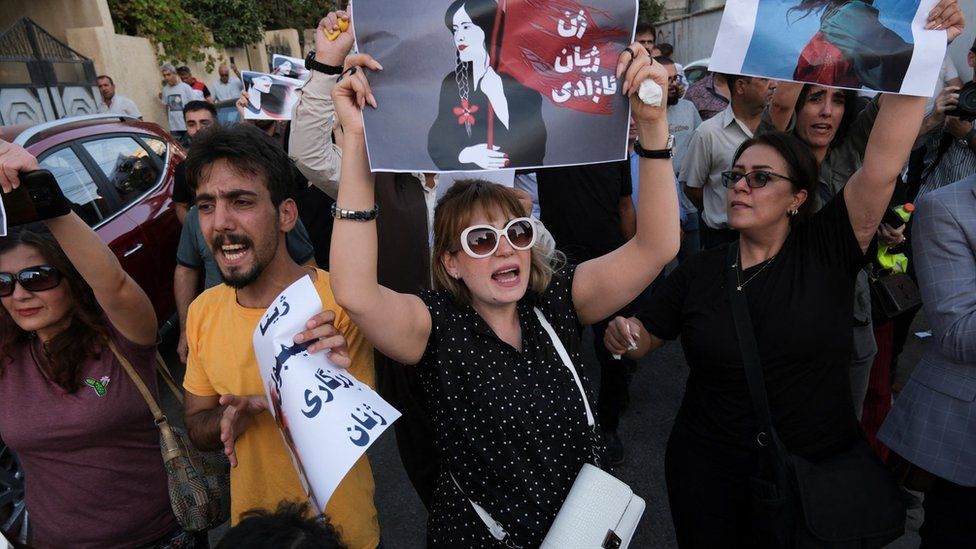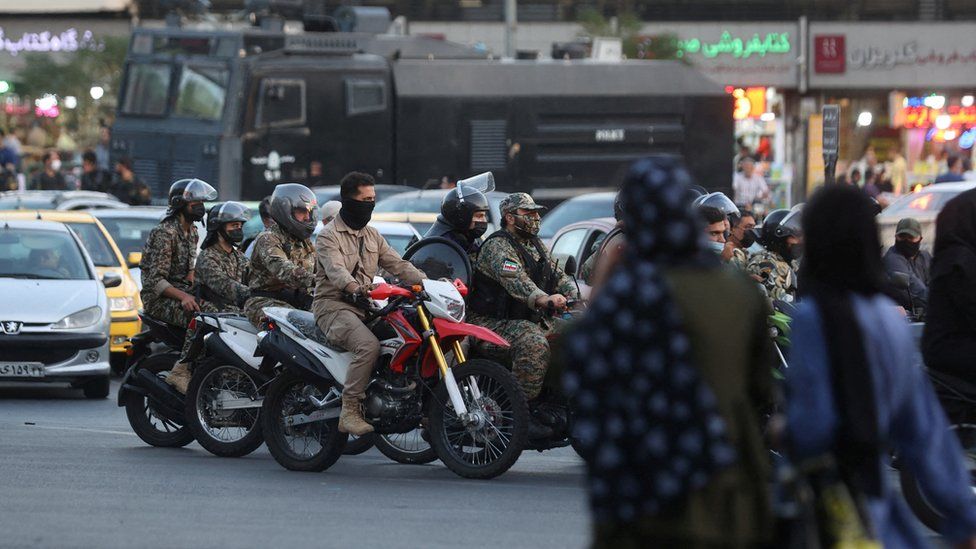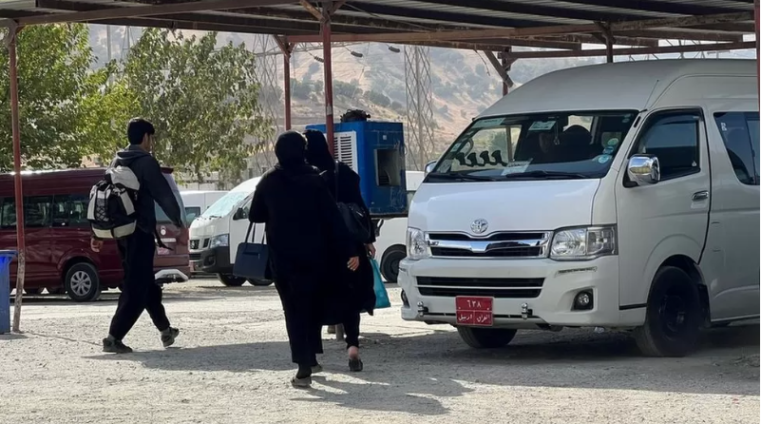Soran raises two fingers to his left temple and motions firing a gun. "If you talk, they will put a bullet in your head," he tells me.
Around us, the Iranian mountains reach skywards. We're at a bus station in Penjwen, a town in Iraq's northern Kurdistan region that is close to the crossing post on the border with Iran. Cars sporadically pull in and discharge their occupants into the dusty courtyard. Some pause and drink tea, while others climb straight into the small minibuses that'll take them to the nearby Iraqi city of Sulaimaniya.
Soran uses his hands often when he talks. His feet too, as he kicks out to show me how he was beaten by Iranian security forces.
"It happened a few days ago when I was protesting," he says. "The regime beat me in the back, they kicked me and used truncheons to hit me. They shot my friend, and others too. All because I took part in the demonstrations."
Soran is 32 and lives in Saqqez, the home city of Mahsa Amini, the 22-year-old Kurdish woman whose death in police custody three weeks ago sparked anti-government protests that have engulfed Iran.
Soran has crossed into Iraqi Kurdistan to work, but he questions whether he'll return home. The protests are growing, and life is hard. He says there hasn't been any internet for three weeks now due to restrictions imposed by the Iranian authorities, which have cracked down violently on the protests.
"We used to be afraid of the regime, but now the wall of fear has collapsed. Nobody is frightened anymore."
But when I asked if this would lead to the collapse of the Islamic Republic, his answer was clear: "No, the regime won't collapse. It can't be changed. They are strong and they keep killing people. We will never stop, and so they will keep killing us."
"It's crazy, and it's corrupt. Nobody cares about us. The outside world says it supports Iran, but nobody does. We are being tortured and killed every day."

As a pack of wild dogs sleeps in the shade of a parked lorry, a new group forms at the minibus stop. Crouching in a low circle, they chat as they wait to leave. Most are Iraqi Kurds, but one is Iranian, and he describes his life to the others.
Farhad is 36 and from Sanandaj, where there have been heavy protests and deadly clashes with security forces. The Kurdish human rights group Hengaw reports that at least 32 civilians have been killed by government forces and 1,540 others injured in Kurdish-populated western Iran, but Farhad believes the death toll is far higher.
"At least 20 were killed last night," he tells the the group. "Some say as many as 40. More than 70 were arrested. But we can't talk about it, because we'll be killed. Iranian intelligence are always watching, they secretly film. They imprisoned my brother in jail for political reasons.
"These protests are getting bigger, but they won't bring down the regime. No, it's strong. Controlling. The Islamic Republic will definitely survive."
Kurdistan under fire — With #IranProtests2022 entering their 4th week, all eyes have turned to the Kurdish city of Sanandaj (#سنندج), in west Iran, with authorities launching a deadly crackdown on any sign of dissent. #مهسا_امینی pic.twitter.com/LgfWSziHKD
— Khosro Kalbasi Isfahani (@KhosroKalbasi) October 11, 2022
Tuana is next in line for the bus. He's now based on the Iraqi side of the border, but spent more than 20 years living in Iran. He still returns there three times a week to work.
Wearing a crisp white shirt and sunglasses, he describes some of the changes he's seen in the last few weeks in western Iran.
"There's an increase in forces on the border. They don't look like the military - maybe militias?" he says.
"I'm seeing more vehicles transporting more men. It looks like they're being brought from other parts of Iran into the Kurdish areas here. Helicopters too. We rarely saw them before, but now they're always up in the sky."
Tuana also noticed a difference in the traffic at the Iranian border crossing.
"It's drastically reduced. People are only really coming now for work, they're scared that if they leave they will be considered members of the opposition forces, or even a spy."
"Iranians really need some outside support. But they're not getting that support."
There are rumours spreading too of drastic consequences if people join the demonstrations, Tuana says.
"It spreads through conversations. My friends in Karaj [near Tehran] have been hearing these things. That the regime will empty the bank accounts of the participants. Or as winter nears, that their gas will be cut off and they'll be left freezing."
An hour before sunset, there's just a small handful of people still arriving.

Soroush is studying at Tehran University, and travelling over the border for a job related to his studies. His long beard is streaked with orange and silver, and tells me he speaks English as he collects the money from the other men in the queue to pay for the journey.
"The students in Tehran are protesting, yes, and I am protesting. But 80% of people who live there are still happy with the regime, even though its men walk the streets with guns and kill people."
"Jin, Jiyan, Azadi," Soroush smiles, punching the air. It's the slogan of the protesters, and means "Woman, Life, Freedom".
It makes me acutely aware that, even though this is a female-led movement, I haven't managed to hear stories from a single woman at the border. They make up a much smaller percentage of travellers than men. And of the ones I spoke to, each one was warned off from speaking about the demonstrations by their travelling companions.
One older woman greeted me warmly as she climbed from the taxi, and asked how my day had been. When I wondered aloud what her thoughts were on the situation at home, her son cut in sharply. "Don't say anything."
She picked up her overstuffed, white cotton bag, smiled, and silently walked away.
Latest Stories
-
Government of Ghana endorses Trans-African Tourism and Unity Campaign
44 seconds -
WAFCON 2024: Chantelle Boye-Hlorkah credits team unity for Black Queens’ quarter-final berth
6 minutes -
A Giant Leap for African Unity: Kenya’s historic Visa-Free policy and the Trans African tourism and unity campaign
12 minutes -
Holuta Aflakpe DA JHS wins 10th edition of Ho West District Quiz Competition
12 minutes -
Daniel Ayittah becomes first Ghanaian gospel engineer to join GRAMMY Academy
21 minutes -
GES to scale up transformative Kindergarten programme nationwide
22 minutes -
BoG to mark 60 years of the Cedi with anniversary celebration in August
22 minutes -
Prison Service to produce furniture, uniform for schools – Interior Minister
25 minutes -
Ras Mubarak leads 38-country Trans Africa Unity drive, begins August 18
27 minutes -
19 injured, 4 critical in Central Region crash involving 2 Sprinter buses
29 minutes -
Minority MPs demand reversal of Mahama’s ban on State land transactions
44 minutes -
Too many Ghanaian businesses continue to price in US dollars – BoG Governor
50 minutes -
Cedi rising; Ghana must rise too – BoG Boss
53 minutes -
Emmanuel Wie-Addo writes: Tapping into a $1.8tn space economy
1 hour -
Ghana must shift from raw commodity exports to value-driven growth – Dr Asiama
1 hour

